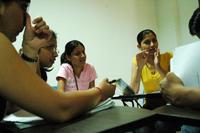Young learners ages 4 to 12 are the best ages to start learning a new language according to a study. Over the previous decades, there was a huge exertion of driving in teaching Modern Foreign Language (MFL) in Primary institutions. Children have opportunities to learn English language, Spanish language, Chinese language, and many foreign languages that depend on what the schools required.

Students interacting during an in-class discussion. (Photo credit: Wikipedia)
Although there are some skepticism exists concerning about MFL added in the curriculum, but it does still exists. Despite some negative perceptions in MFL, the following will make everyone think it is really important for it to be added in the school’s set of courses:
- The MFL such as to learn English language visibly benefits the young person as they obtain to clench by the system of the language. Young students will develop in terms of writing, reading, and speaking the specific language taught to them which are great skills to employ in the coming years of their lives.
- When it comes to traveling to another country wherein the new language that the child has had learned, he or she will find no difficult to deal with communicating and interacting with the native people. Hence, the chance to expose to the culture which is largely unlike from their own may result bigger easiness of their constructive viewpoints, including to becoming more responsive of their personality in the broader world.
- To learn English in Washington can be much more beneficial knowing that you are learning in the country of its origin. But since young learners depend on school classes, learning all the while can turn young students into well-prepared and more eager in practicing language learning to the uppermost echelon.

